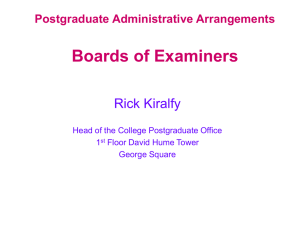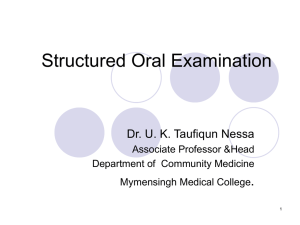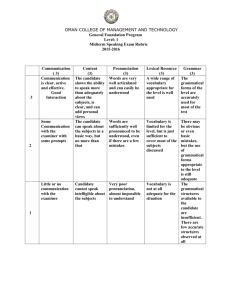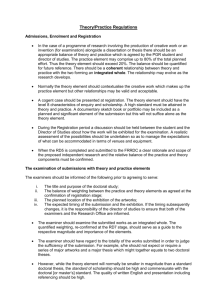Summary of procedures for PhD Education matters
advertisement
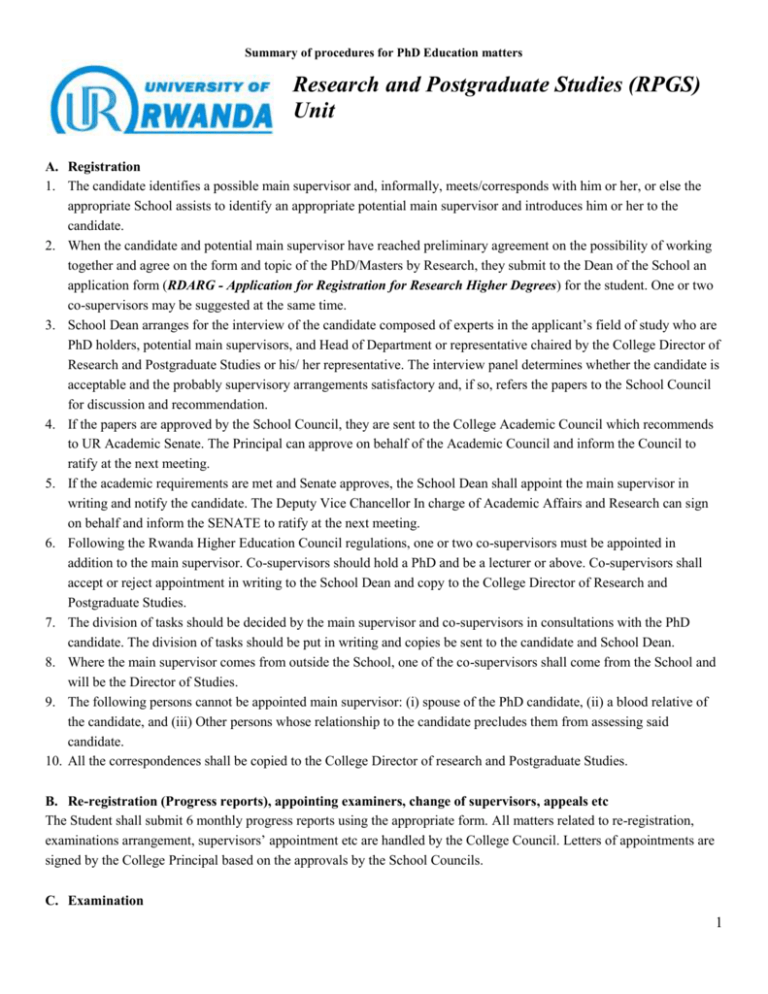
Summary of procedures for PhD Education matters Research and Postgraduate Studies (RPGS) Unit A. Registration 1. The candidate identifies a possible main supervisor and, informally, meets/corresponds with him or her, or else the appropriate School assists to identify an appropriate potential main supervisor and introduces him or her to the candidate. 2. When the candidate and potential main supervisor have reached preliminary agreement on the possibility of working together and agree on the form and topic of the PhD/Masters by Research, they submit to the Dean of the School an application form (RDARG - Application for Registration for Research Higher Degrees) for the student. One or two co-supervisors may be suggested at the same time. 3. School Dean arranges for the interview of the candidate composed of experts in the applicant’s field of study who are PhD holders, potential main supervisors, and Head of Department or representative chaired by the College Director of Research and Postgraduate Studies or his/ her representative. The interview panel determines whether the candidate is acceptable and the probably supervisory arrangements satisfactory and, if so, refers the papers to the School Council for discussion and recommendation. 4. If the papers are approved by the School Council, they are sent to the College Academic Council which recommends to UR Academic Senate. The Principal can approve on behalf of the Academic Council and inform the Council to ratify at the next meeting. 5. If the academic requirements are met and Senate approves, the School Dean shall appoint the main supervisor in writing and notify the candidate. The Deputy Vice Chancellor In charge of Academic Affairs and Research can sign on behalf and inform the SENATE to ratify at the next meeting. 6. Following the Rwanda Higher Education Council regulations, one or two co-supervisors must be appointed in addition to the main supervisor. Co-supervisors should hold a PhD and be a lecturer or above. Co-supervisors shall accept or reject appointment in writing to the School Dean and copy to the College Director of Research and Postgraduate Studies. 7. The division of tasks should be decided by the main supervisor and co-supervisors in consultations with the PhD candidate. The division of tasks should be put in writing and copies be sent to the candidate and School Dean. 8. Where the main supervisor comes from outside the School, one of the co-supervisors shall come from the School and will be the Director of Studies. 9. The following persons cannot be appointed main supervisor: (i) spouse of the PhD candidate, (ii) a blood relative of the candidate, and (iii) Other persons whose relationship to the candidate precludes them from assessing said candidate. 10. All the correspondences shall be copied to the College Director of research and Postgraduate Studies. B. Re-registration (Progress reports), appointing examiners, change of supervisors, appeals etc The Student shall submit 6 monthly progress reports using the appropriate form. All matters related to re-registration, examinations arrangement, supervisors’ appointment etc are handled by the College Council. Letters of appointments are signed by the College Principal based on the approvals by the School Councils. C. Examination 1 Summary of procedures for PhD Education matters Research and Postgraduate Studies (RPGS) Unit Summary: When the candidate is about to finish, say, within the next six months or so, the School can start the process of appointing examiners and the candidate can apply for intention to submit. Below is Section B4 of the Quality Manual 6 that describes the examination process. In summary, the Director of Studies in consultation with the Dean of School should identity at least two and at most three examiners. Of these, one is an external examiner. The Dean of Schools shall propose their names to School Council which approves them. The examination will be in two stages, the first known as preliminary examination is when the external and internal examiners read the thesis and submit their preliminary report and recommendations using appropriate forms for the case of re-examination. Supervisors will not be examiners. One of the supervisors can attend the oral (viva voce). Also the Dean proposes a Chair of the Viva Voce, an appropriate form is used for that purpose. The candidate should submit his or her thesis to the College Registrar using an appropriate form. Once the School approves the examiners, the College Registrar will distribute the thesis to examiners and will receive the preliminary reports and pass them to the Dean of School. The registrar will notify the candidate, examiners and supervisors of the examination date in consultation with the Dean. The School Dean will arrange and ensure the viva voce takes place smoothly. Correspondences should be copied to the College Director of Research and Postgraduate Studies. Examination in General: (i) Stages of Examination The examination for the Research Masters degree and PhD shall have two stages: firstly the submission and preliminary assessment of the thesis, and secondly its defence by oral or approved alternative examination iii) Location and Language of Oral An oral examination shall normally be held in Rwanda. Except with the specific permission of College Principal, the oral shall be conducted in English. iv) Non-Examiners permitted at Oral With the consent of the candidate, one supervisor may attend the oral examination, and he or she may participate in the discussion to the extent permitted by the examiners, but he or she shall withdraw prior to the deliberations of the examiners on the outcome of the examination. In cases where a supervisor is unable to be present, and the candidate wishes to be accompanied in the viva, arrangements should be made for a member of academic staff with supervisory experience to be present. v) Appointment of Independent Chairs An Independent non-examining Chair will be appointed for all oral examinations. viii) Ratification of Examiners’ Recommendations School Council shall make a decision on the reports and recommendation(s) of the examiners in respect of the candidate. ix) Cheating or Plagiarism suspected in the thesis. Where evidence of cheating or plagiarism in preparation of the thesis, or other irregularities in the conduct of the examination come to light during, or subsequent to the recommendation of the examiners, the School Council shall consider the matter, if necessary in consultation with the examiners, and take action in accordance with the Regulations on Cheating and Plagiarism in Research Degrees. x) Conduct of Examinations: School Council shall ensure that all examinations are conducted and the recommendations of the examiners are presented wholly in accordance with the Institution's regulations and Code of 2 Summary of procedures for PhD Education matters Research and Postgraduate Studies (RPGS) Unit Practice for Research Viva Voce Examinations. In any instance where the School Council is made aware of a failure to comply with all the procedures of the examination process, it may declare the examination null and void and appoint new examiners. xi) Nomination of Examination Team: The Director of Studies in consultation with the Dean of School shall propose to the School Council, on the appropriate form, the arrangements for the candidate's examination. The examination may not take place until the examination arrangements have been approved. In special circumstances School Council Chairperson may act directly to appoint examiners and arrange the examination of a candidate. xii) Notifications to Candidate of Procedures: The College Registrar shall make known to the candidate the procedure to be followed for the submission of the thesis (including the number of copies to be submitted for examination) and any conditions to be satisfied before the candidate may be considered eligible for examination. xiii) Notification of Date of Oral Examination: The College Registrar shall notify the candidate, all supervisors and the examiners of the date of the oral examination. xiv) Circulation of Theses to Examiners: (a)The College Registrar shall send a copy of the thesis to each examiner, together with the examiner's preliminary report form and the Institution's regulations, and shall ensure that the examiners are properly briefed as to their duties. (b) The Registrar shall ensure that all the examiners have completed and returned the preliminary reports to the Institution before the oral examination takes place. The Candidate's Responsibilities in the Examination Process i) Submission prior to Expiry of Registration The candidate shall ensure that the thesis is submitted to the Registrar of the Institution before the expiry of the registration period, and shall ensure that each copy of the thesis is complete before submission. ii) Conditions of Eligibility The candidate shall satisfy any conditions of eligibility for examination required by School Council. iii) Examination Arrangements The candidate shall take no part in the arrangement of the examination and shall have no formal contact with the External Examiner(s) between the appointment of the examiners and the oral examination. iv) Candidate’s discretion in Submission The submission of the thesis for examination, for the level of award for which they are registered, shall be at the sole discretion of the candidate. v) Submission Declaration The candidate shall also obtain the signatures of the Supervisors indicating that they have been consulted about the submission. Where the supervisors do not think the thesis ready for examination, this shall not be a bar to the candidate submitting it if he or she is determined to do so. The declaration form shall be forwarded to the Examiners. vi) Thesis format The candidate shall ensure that the thesis format is in accordance with the requirements of the Institution's regulations. Theses may be submitted for examination either in a permanently bound form or in a temporarily bound form which is sufficiently secure to ensure that pages cannot be added or removed. The thesis shall be presented in a permanent binding of the approved type before the degree may be awarded. A thesis submitted in a temporarily bound form shall be in its 3 Summary of procedures for PhD Education matters Research and Postgraduate Studies (RPGS) Unit final form in all respects save the binding. In such cases the candidate shall confirm that the contents of the permanently bound thesis are identical with the version submitted for examination, except where amendments have been made to meet the requirements of the examiners. vii) Binding Costs The candidate shall be responsible for costs incurred in the submission of the thesis for examination and the final binding. Examiners i) Composition of Examination Team A candidate shall be examined by at least two and normally not more than three examiners, of whom at least one shall be an External Examiner. An Internal Examiner shall be defined as an examiner who is a member of staff of the Institution. No member of the candidate’s supervisory team may act as an internal examiner. iv) Examination of Staff Candidates Where the candidate and the Internal Examiner are both on the permanent staff of the same establishment, a second External Examiner shall be appointed. A candidate who is on a fixed short-term employment contract (for instance, a research assistant) shall be exempt from the requirements of this regulation. v) Definition of External Examiner An External Examiner shall both be independent both of the Institution and not have acted previously as the candidate's supervisor or adviser, or normally, as transfer assessor, or research collaborator. Any prior connection with the candidate must be declared at the point of nomination as an Examiner on the Examiner Contract form. An External Examiner shall normally not be either a supervisor of another candidate or an External Examiner on a taught course in the same department at the Institution. Former members of staff or former students of the Institution shall normally not be approved as External Examiners until three years after the termination of their employment or completion of their studies with the Institution. School Council shall ensure that the same External Examiner is not approved so frequently that his/her familiarity with the academic unit might prejudice objective judgement. vi Experience of Examiners a) Examiners shall be experienced in research in the general area of the candidate's thesis and, where practicable, have experience as a specialist in the topic(s) to be examined. b) Within the limits of a maximum of three examiners, every effort should be made to appoint examiners to cover the academic content of interdisciplinary theses. c) At least one External Examiner shall have experience (normally two or more previous examinations) of examining research degree candidates. vii) Ineligibility of Research Students to act as Examiners No candidate registered for a research degree shall act as an Examiner. viii) External Examiners Fees and Expenses The Institution shall determine and pay the fees and expenses of the examiners. 4 Summary of procedures for PhD Education matters Research and Postgraduate Studies (RPGS) Unit First Examination i) Examiners’ Confidential Independent Preliminary Reports Each examiner shall read and examine the thesis and submit an independent preliminary report on the appropriate form to the Registrar seven days before any oral or alternative form of examination is held, for exchange between the Examiners. In completing the preliminary report, each examiner shall consider whether the thesis provisionally satisfied the requirements of the degree and where possible make an appropriate provisional recommendation subject to the outcome of any oral examination. Except where otherwise authorised by the Examiners, the content of the reports will be held in confidence between the Examiners and (following the oral examination). ii) Examiners’ Final Reports on First Examination Following the oral examination the examiners shall, where they are in agreement, submit, on the appropriate form, a joint report and recommendation relating to the award of the degree to the Registrar. The preliminary reports and joint recommendation of the examiners shall together provide sufficiently detailed comments on the scope and quality of the work to enable School Council to satisfy itself that the recommendation is correct. Where the examiners are not in agreement, separate reports and recommendations shall be submitted. iii) Examiners’ Recommendations Following the completion of the examination the examiners may recommend: a) that the candidate be awarded the degree; b) that the candidate be awarded the degree subject to amendments being made to the thesis; c) that the candidate be permitted to re-submit for the degree and be re-examined, with or without an oral examination; d) that the candidate not be not awarded the degree, with no possibility of re-examination ; e) in the case of a PhD examination, that the candidate be awarded the degree of Research Masters degree, perhaps subject to the presentation of the thesis amended to the satisfaction of the examiners. iv) Amendments Where the examiners are satisfied that the candidate has in general reached the standard required for the degree, but consider that the thesis requires some amendments and corrections not so substantial as to call for the submission of a revised thesis, and recommend that the degree be awarded subject to the candidate amending the thesis to the satisfaction of the internal and/or the External Examiner(s,) they shall indicate to the candidate in writing what amendments and corrections are required. Amendments constitute spelling or typing errors, minor textual corrections, reordering of material, further analysis and/or further clarification of the research but not requiring further research to be undertaken. The time limit for submission of amendments shall be at the discretion of the examiners, subject to a maximum of 4 months. The candidate shall submit the amended thesis within the time limit specified by the examiners from the date of delivery to the candidate of the list of amendments and corrections required. v) Non-unanimous Recommendations Where the examiners' recommendations are not unanimous, School Council may a) accept a majority recommendation (provided that the majority recommendation includes at least one External Examiner); 5 Summary of procedures for PhD Education matters Research and Postgraduate Studies (RPGS) Unit b) c) accept the recommendation of the External Examiner; or require the appointment of an additional External Examiner. vi) Appointment of Additional External Examiner Where an additional External Examiner is appointed under sub-paragraph (v) c) above, he/she shall prepare an independent preliminary report on the basis of the thesis and, if considered necessary, may conduct a further oral examination. That examiner should not be informed of the recommendations of the other examiners. On receipt of the report from the additional examiner School Council shall complete the examination as set out in paragraph (vi). viii) Referral prior to Oral Where the examiners are of the opinion that the thesis is so unsatisfactory that no useful purpose would be served by conducting an oral examination, they may recommend that School Council dispense with the oral examination and refer the thesis for further work. In such cases the examiners shall provide School Council with written guidance for the candidate concerning the deficiencies of the thesis. The examiners shall not recommend that a candidate fail outright (see sub-paragraph (iii) d)) without holding an oral examination or other alternative examination (see paragraph (iii)). ix) Notification of deficiencies of Theses Where the School Council decides that the degree be not awarded and that no re-examination be permitted, the examiners shall prepare an agreed statement of the deficiencies of the thesis and the reason for their recommendation, which shall be forwarded to the candidate by the College Registrar. 6
